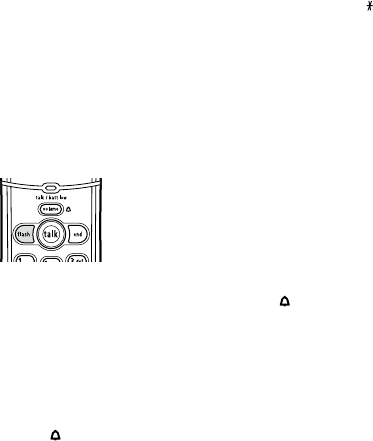
5
Using Your Phone
Making and Receiving Calls
Making a call
1) Pick up the handset from the base.
2) Press [talk]. The talk/batt low LED ashes and turns on.
3) Listen for the dial tone.
4) Dial the number.
Receiving a call
If the handset is in the base, simply remove the handset from the base. AutoTalk will
automatically answer the call.
If the handset is off the base, press [talk], any number key, [ /tone], or [#].
Hanging up
Press [end] or return the handset to the base.
Redialing the last dialed number
1) Pick up the handset from the base.
2) Press [talk]. The talk/batt low LED ashes and turns on.
3) Listen for the dial tone.
4) Press [redial/pause].
Flash and Call Waiting
If you subscribe to Call Waiting service through your telephone
company and a call waiting tone sounds while you are on a call,
press [ash] to accept the waiting call. There is a short pause, and
you will hear the new caller. To return to the original caller, press
[ash] again.
Adjusting the Ringer Tone
When the phone is in standby, press [volume/ ] to switch between the two ringer tones.
The last ringer tone heard will be selected as the phone’s ring tone setting.
Temporarily Mute Ringer
If the handset is off the base, simply press [end] to temporarily mute the incoming ring for
that particular call. The ringer will sound with the next incoming call.
Adjusting the Earpiece volume
The handset earpiece volume settings can only be adjusted during a call. To adjust, press
[volume/ ] to scroll through the three volume levels and select the one that works best
for you. When you hang up, the phone keeps the volume setting.
Traveling Out-of-Range
During a call, as you begin to move your handset too far from your base unit, noise
increases.
If you pass the range limits of the base, your call will terminate within one minute.
Selecting a Different Channel
If you encounter interference while using your phone, you can manually change the
phone’s channel for clear operation. During a call, press [channel] to change the
channel. The talk/batt low LED ashes, indicating the phone is changing to another
channel. For more information on interference, refer to “Radio Interference” on page 10.














